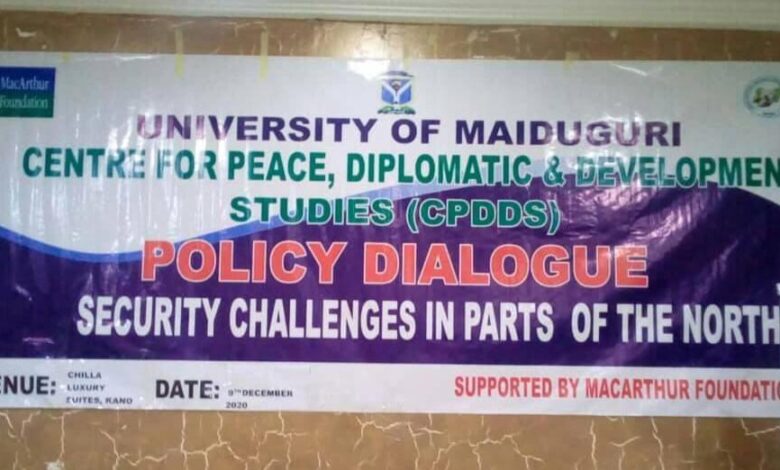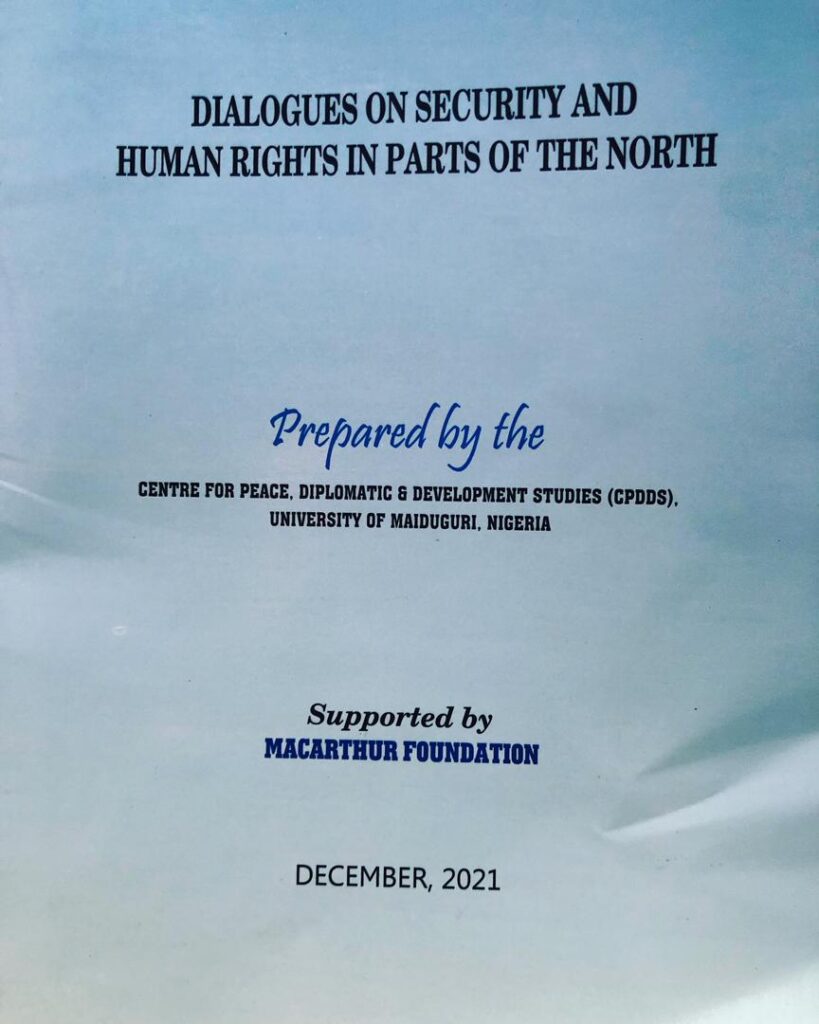Report Review: Insecurity and Human Rights Abuse in Northern Nigeria
After facilitating nine policy dialogues on ‘Security and Human Rights in Parts of the North’, the University of Maiduguri Centre for Peace, Diplomacy and Development Studies (CPDDS) reported participants’ observation on the government's failure to fully protect citizens’ rights in the conflict-ridden areas of the region.

With the government failing to fully secure citizens’ rights in the conflict-ridden areas of northern Nigeria, other sectors of the society must sternly intervene to curb the menaces, CPDDS warned in a project report compiled in Dec. 2021.
The Centre facilitated a policy dialogues project, supported by the MacArthur Foundation. The project report titled, Dialogues on Security and Human Rights in Parts of the North, conveys the position of participants, who in a series of nine policy dialogues, brainstormed on the disturbing human rights consequences of insecurity and suggested policy options for addressing the challenges.

The participants included representatives of security agencies, civil society organisations, vigilante groups, the Nigerian Bar Association and the media. Against the conventional security and human rights discourses in northern Nigeria, the participants did not really suggest that the Nigerian government has totally failed or that the region is simply replete with ‘ungoverned spaces’.
Instead, they posited that in northern Nigeria, security and human rights are on a precarious balance. And this is owing to the hopeless entangling of a number of factors: underlying deterioration of cultural values, population explosion, availability of poorly or illegally goverened areas, massive increase in terrorist/criminal activities, untactful counterinsurgency operations, porous borders, deficient security systems, inefficient media practices, corrupt justice system, citizens’ ignorance of their rights, climate change, corrupt governance, etc.
This broad view allowed the participants to agree that citizens’ rights to life, property, association, movement, religion, speech, health, education and liberty are doubly abused by state and non-state actors.
Beyond the obvious abuses of civilians’ rights by criminals and terrorists, almost every move by the government and its security and legal institutions seems like an invitation to human rights abuse. For example, the excessive militarisation of counterinsurgency operations have caused the lives of many innocent non-combatants. Multiple displaced persons have faced serious assaults at government-established Internally Displaced Persons (IDP) Camps. Unlawful arrest and detention of suspects have become a subject of rant, as is the alleged complicity of traditional rulership in criminality.
Hasty community-based responses, such as the investment in vigilantes have also not helped matters: the vigilantes “were also alleged to have committed human rights abuses despite their close working relationship with the security agencies.”
With these broad analyses, the nine policy dialogues are much more perceptive than many insecurity discourses in northern Nigeria. And it is hard to disagree with the participants’ underlying message, that for over a decade, the government has deluded itself into believing that its inefficient security and legal institutions could solve the region’s security problems without paying the required attention to the deadlier, endemic scourges of ignorance and poverty.
The government and the citizens have pinned their hopes on a series of fixes – defensive military operations, vigilante operations and negotiating peace with criminals – which have offered only temporary solutions.
The participants suggested a lot of innovative policy options on the need to reduce ignorance, poverty, unemployment and intensify intelligence gathering. They even suggested the establishment of a State Conflict Management Coalition Platform (SCMCP) which would garner and appropriately channel intelligence information.
Obviously confident of the novelty of the policy options suggested by the participants, Dr. Kole Shetimma, the Director of MacArthur Foundation based in Abuja said of the two recently unveiled books, which are the end-products of the policy dialogues, that they “can help in reducing national security issues without infringing upon the rights of civilians”.
In actual sense, however, most of the policy options sound all too much like some of the nobel but hardly implementable policies of the past.
If anything, the ongoing security crises have shown the dangers of relying on corrupt governments and fragile state institutions, which only doubled the assault on human rights in the face of unbearable ravages by criminals.
The participants are right that insecurity and human rights challenges are increasing, even though their policy suggestions seem to be more concerned with ideas than the feasibility of their practical implementation amid Nigeria’s puzzlingly complex security crises.
Support Our Journalism
There are millions of ordinary people affected by conflict in Africa whose stories are missing in the mainstream media. HumAngle is determined to tell those challenging and under-reported stories, hoping that the people impacted by these conflicts will find the safety and security they deserve.
To ensure that we continue to provide public service coverage, we have a small favour to ask you. We want you to be part of our journalistic endeavour by contributing a token to us.
Your donation will further promote a robust, free, and independent media.
Donate HereStay Closer To The Stories That Matter




